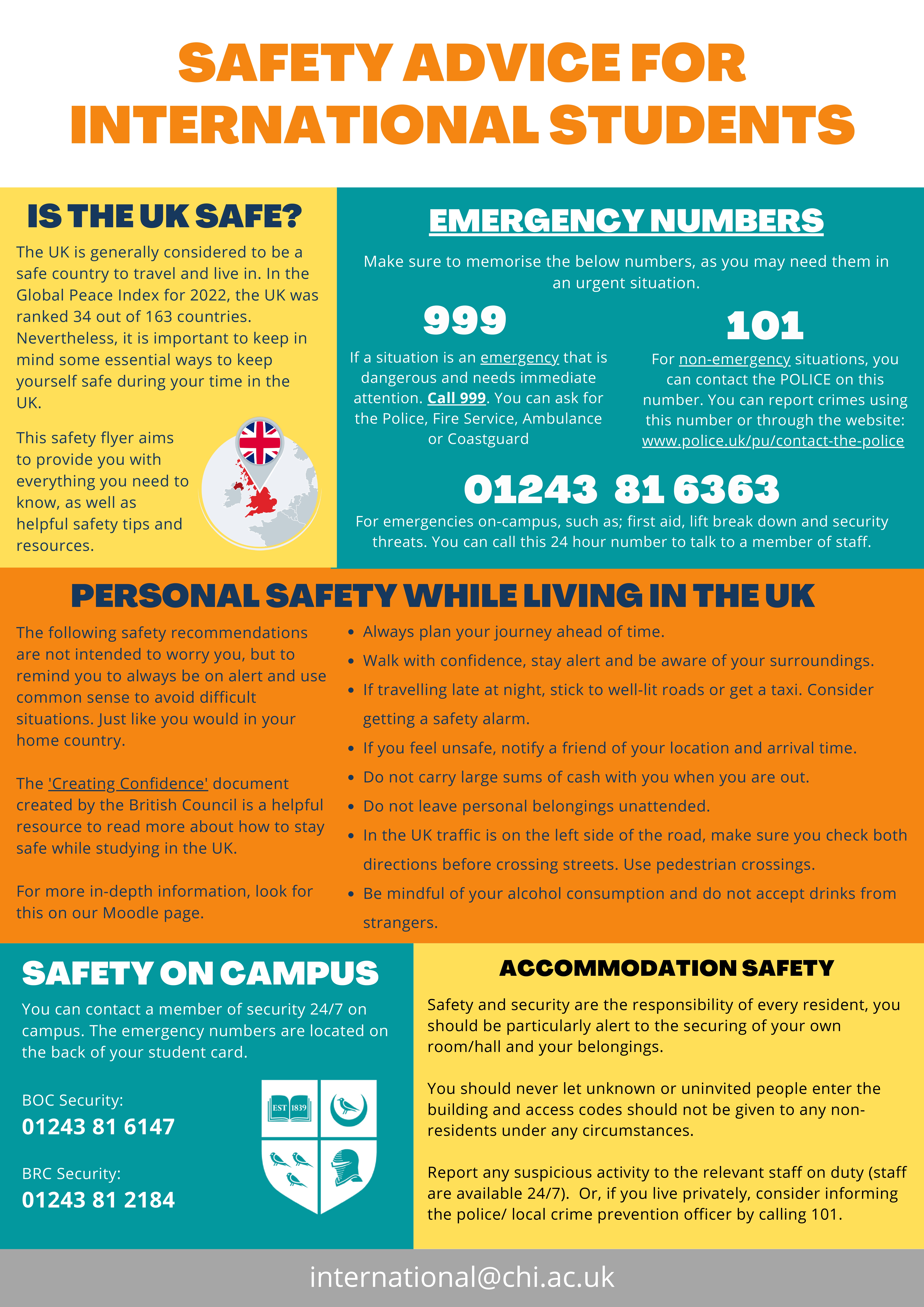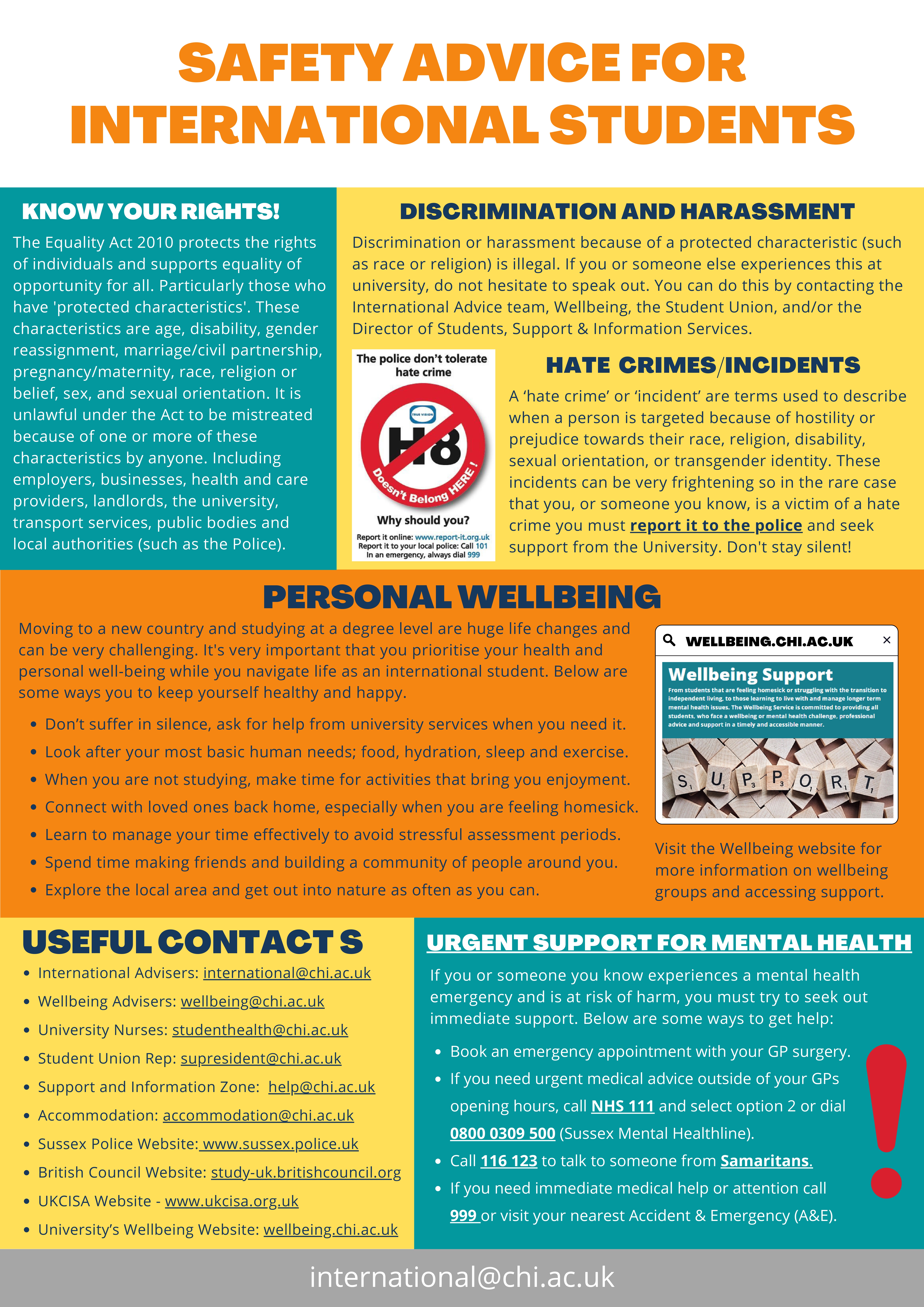Safety Advice
The UK is often considered a safe country for international students to live and study in. In fact, the Global Peace Index for 2022, the UK ranked 34th out of 163 countries.
Studying abroad can be both and exciting and daunting experience for our international students. We recognise it might often be first time living away from home in an unfamiliar country for some of our students, things may be different in the UK than you are used to.
We want everyone to feel safe and at home while studying at Chichester, which is why we strongly encourage students take steps to ensure their safety and wellbeing while enjoying their studying experience.
Here are some important safety recommendations and resources to consider before traveling to the UK:
- Invest time in understanding the local customs and behaviours by speaking to current students or reading blogs. The UK is a diverse multicultural country with regional differences, consider this in your research.
- You will need to keep your belongings safe: do not leave items unattended when in the UK, keep important documents like passports in a secure location, and ensure that your accommodations are properly locked and secured.
- You may need to carry cash until you are able to open a bank account in the UK. Our recommendation is to avoid keep large amounts of cash – instead, try to bring a currency card that works in the UK or arrange to open a bank account before you come.
- Keep in mind that, in the UK, not all streets have adequate lighting. Be prepared that you may feel safer using taxis or walking home with friends when it is dark. In the winter months, it can get dark as early at 4pm!
- Make sure you understand the emergency services available in the UK, including the local police and hospitals. In the UK the emergency number (police, fire and ambulance service) is 999.
- Be cautious of fraud and scams, particularly over the phone, and email. Some criminals may specifically target international students. If you think you have been scammed or have doubts about a request you have received, please speak to a member of staff at the university.
- Prioritise and be mindful of your physical, mental and emotional wellbeing. Consider declaring existing illnesses/disabilities to our Student Support & Wellbeing teams or contacting your doctor in your first weeks at university.
- Stay connected with others. By building relationships and communities, international students can create a support network that can offer assistance and guidance when needed.
We also recommend that you read the British Council’s Creating Confidence booklet.


You can download the above International Safety Flyer .
UK Law & Powers of Arrest
You may find that the laws in the UK are a bit different to where you come from, particularly when it comers to tobacco, alcohol and self- defence sprays.
- Do not carry illegal substances and drugs with you (unless prescribed by a doctor) or use or supply any illegal drugs (E.g. cannabis, ecstasy, LSD and amphetamines).
- Do not carry any sort of weapon e.g. knives, self-defence CS gas sprays, guns and stun guns.
- You must be 18 to buy tobacco. Smoking is not allowed in workplaces and substantially enclosed public spaces. Please see the university’s smoking policy here for more information and use the designated smoking areas for smoking and vaping.
Smoking and vaping is not allowed indoors or near buildings and you must use designated smoking areas for smoking and vaping. Please see the above policy for more information on this,
- Only people over 18 can drink in public, except in areas of towns where Designated Public Place Orders are in place. Police can take away alcohol even outside these areas.
- You should not buy property that might be stolen e.g. via online platforms. You can check the history of used electrical items via this website.
For more information about the UK law, please visit the gov.uk website.
Powers of Arrest
“Police officers in the UK have the power to arrest people who are suspected of having committed an offence. Arrests can also be made if you fail to pay a fine, fail to appear in court when asked to do so, or if you refuse to give your name and address to a police officer when asked (Creating Confidence booklet, link below).”
Please see information about the powers of arrest on the British Council website Creating Confidence booklet, page 25.
Reference: Creating Confidence, British Council.